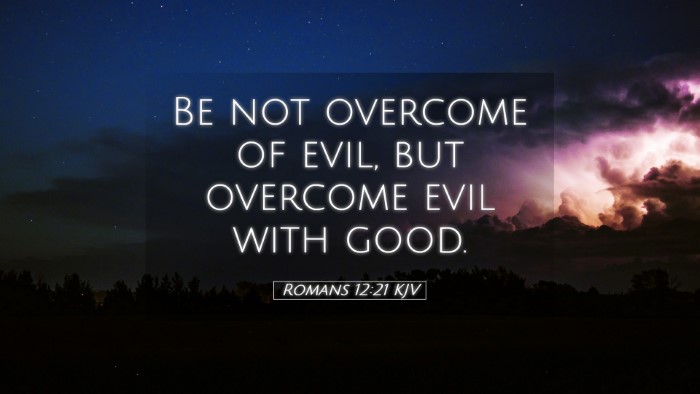Old Testament
Genesis Exodus Leviticus Numbers Deuteronomy Joshua Judges Ruth 1 Samuel 2 Samuel 1 Kings 2 Kings 1 Chronicles 2 Chronicles Ezra Nehemiah Esther Job Psalms Proverbs Ecclesiastes Song of Solomon Isaiah Jeremiah Lamentations Ezekiel Daniel Hosea Joel Amos Obadiah Jonah Micah Nahum Habakkuk Zephaniah Haggai Zechariah MalachiRomans 12:21
Romans 12:21 KJV
Be not overcome of evil, but overcome evil with good.
Romans 12:21 Bible Commentary
Commentary on Romans 12:21
Verse: "Do not be overcome by evil, but overcome evil with good." (Romans 12:21)
Introduction
This verse encapsulates a profound principle for Christian living. The Apostle Paul, addressing the church in Rome, offers a directive that transcends time and culture. The call to overcome evil with good stands as a cornerstone of ethical behavior and spiritual resilience.
Contextual Background
Romans 12 forms part of Paul's epistle where he shifts from doctrinal teachings to practical exhortations. The preceding verses emphasize love, humility, and the various gifts of the Spirit. In this context, verse 21 acts as a climactic conclusion to Paul's encouragement to live harmoniously in a world often hostile to Christian values.
Exegesis of the Text
The verse can be divided into two primary directives:
- Do not be overcome by evil: This command warns believers against succumbing to the negative influences or actions of others. It speaks to the human tendency to react to evil with more evil, fostering a cycle of sin and retaliation.
- Overcome evil with good: Instead of responding reactively, believers are urged to adopt a proactive stance, deploying goodness as a weapon against malevolence.
Theological Implications
This verse serves as a reminder of the overarching narrative of redemption in the Scriptures, where good ultimately triumphs over evil—a theme reflected in the life and ministry of Jesus Christ. Adams Clarke notes that good actions are not merely a defensive posture but an offensive strategy against the powers of darkness.
Insights from Public Domain Commentaries
Matthew Henry's Commentary:
Henry emphasizes the moral imperative for believers to resist evil influences. He states, "We must not only avoid being overcome but also actively seek to overcome the evil in the world through righteousness and benevolence." Henry draws upon Jesus' teachings in the Sermon on the Mount, illustrating the radical nature of Christian love that seeks the welfare of even one's enemies.
Albert Barnes' Notes:
Barnes echoes this sentiment by highlighting that the essence of this command is to reflect the character of Christ. He states that "the spirit of revenge is incompatible with the Christian faith." Barnes stresses that overcoming evil with good is an act of faith that reflects divine grace and should be the hallmark of a true follower of Christ.
Adam Clarke's Commentary:
Clarke adds depth by explaining that this overcoming is not merely by words but by actions that embody love and kindness. "Good deeds," Clarke writes, "have a transformative power that can change hearts and ultimately dismantle the strongholds of evil." He posits that living out this teaching is imperative for preserving the integrity and witness of the church amidst societal chaos.
Practical Applications
This verse invites introspection on how one responds to personal injustices. How can we embody goodness in contexts where we feel wronged? Here are several practical applications:
- Personal Relationships: Strive to respond to hostility with kindness. Perhaps a colleague wronged you; instead of retaliation, offer them assistance or a kind word.
- Community Engagement: Involving oneself in community service can be a form of overcoming evil with good—engaging in acts that build up rather than break down.
- Conflict Resolution: In family or church disagreements, approach conflicts seeking reconciliation through understanding and grace rather than animosity.
- Prayer and Forgiveness: Commit to praying for those who mistreat you, asking God to guide your heart toward forgiveness and generous thoughts.
Conclusion
Romans 12:21 presents a clarion call to a transformative way of living that mirrors the essence of the Gospel. By refusing to be overcome by evil, believers actively participate in God's redemptive work in a broken world. The collective voices of Matthew Henry, Albert Barnes, and Adam Clarke converge on a common theme: overcoming evil with good is not merely an ideal but a practical, actionable strategy for every Christian.


